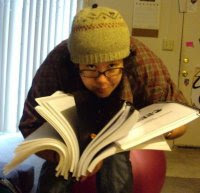As the time to teach approaches I've been thinking more and more about how to best get my students involved mentally and perhaps even, dare I say, emotionally in their largest project. Last term I had some success with this by prompting them to write a 10 minute rant about something that as always interested or fascinated them. This could be something they really love, such as the word fork, or something that has bewildered them, such as: why isn't there a licence to reproduce? Or why do some dorm students find being rude to housekeepers acceptable? These topics produced amazing papers which shows me that this quick write was useful and worth repeating.
Now I am trying to think of ways to address other issues I see in my student's work. One issue that seems perennial is the fear of the book. This paper has a number of source requirements which the students must meet in order to succeed. One of these requirements is a book source. All this means is that all WR 121 students must find a book which they can use information from in order to produce their paper. Simple right? No.
When I started teaching this class roughly one year ago I was certain that this requirement would be the easiest. Surely all my students know what a book is and how to find one. Wrong. They understand the difference between credible and non-credible web sources with ease. They even have a reasonably firm understanding of peer-review journals and how they differ from magazines by the time the paper is due. What they often don't get is how to find a book that is suitable for their paper.
Fading print literacy? I can't say, but what I can say is that I am hoping to teach at least one full class in the library this coming term. My plan right now is to have each of my classes meet me in the library as soon as topic selection is done. There we will have a quick refresher on how to get around the building, how to shelf read library of congress, and how to look things up effectively in the catalog. After this there will be 10-15 minutes of time for them to gather up at least two possible book sources. We will then reconvene at an appointed location for a talk about indices and why they are your friend.
As I was saying to Bird the other day I sometimes think the index is the most important part of a book. When I take out a book from the library and it is brimming with pages but no index I just want to scream. I'm thinking "Who are you to offer me so much information and no way to find it without reading this whole damn thing!?!"
So yes, I love indices and I want to share this love with my students. Hopefully the combination of being physically in the library with them and guiding them through the process of determining how useful or not useful a particular book is will help them to find new ways to approach the "problem" of a book source.
On the topic of books, I stumbled upon a blog today where the following video clip was posted. I was deeply amused by it.


3 comments:
I've learned to apperciate indexes...so therefore it can be done...i mean this is me we're talking about. I'm sure that if anyone can do it you can. Good luck with your preparations.
Part of the problem is that students don't understand that they don't need a book that is a perfect fit for their topic. For example, a student writing a paper on the effects of coffee growing techniques (the benefits of shade grown coffee, for example) on habitats for migrating birds lamented that she couldn't find a book on the topic. But I said, you can find books on coffee growing, right? and books on migrations of birds and habitats, right? Well, yes, she could, but it never occurred to her to go about it that way. Also, student fear they will have to read an entire book. And while I do sigh when they meet their book requirement with a half line from page 1 (apparently as far as they got), it is certainly true that they could use the -- Index -- to find the most useful parts. But some students don't even know how an index works.
And speaking of indices, I am reading Cahill's Sailing the Wine Dark Sea about what we have inherited from Greek civilization (good and bad, war, poetry, etc) and I was shocked that the index did not mention rhetoric! It may be that the chapter on philosophy will mention rhetoric - how could it not??- but I think I ought to write him a letter about that. After all, politics needs rhetoric. As we too plainly see.
Nice and beautiful article that is important for us.
dog waste bags
Post a Comment